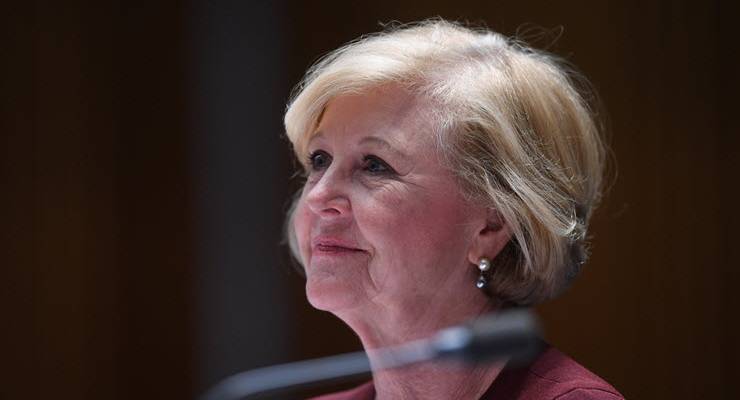
Gillian Triggs is concerned with the state of the world. The former president of the Australian Human Rights Commission (AHRC) and formidable legal scholar fears the pandemic has become a convenient excuse to forget about human rights.
“COVID is being used as a camouflage for a much more restrictive set of policies, even for traditional liberal democracies. It’s very, very worrying,” Triggs told a Crikey subscribers’ event last night.
Around the world, drawbridges are being pulled up, borders are shutting down, police and military hold greater rein over our lives — all in the name of stopping the virus. The challenge, Triggs says, is to ensure these restrictions are “necessary and proportionate”.
The eye of the storm
Triggs is living in Geneva where she is assistant high commissioner for protection at the United Nations High Commission for Refugees (UNHCR).
In some ways it’s a world away from her AHRC tenure, where she was at the centre of an outrage storm brewed by opportunistic politicians and hyper-partisan media outlets.
But in 2020 her work with the UNHCR has been hit by a different sort of storm: COVID-19.
“COVID has seen the most serious challenge to fundamental norms of refugee law that we’ve ever seen in the 70-year history of the UN,” she says.
The question of how to deal with more than 80 million displaced people, using an 1950s refugee convention, against a backdrop of a changing climate and bubbling nativism and xenophobia across the West was maddening enough before the pandemic. Now it’s even more daunting.
Since March, 168 countries have closed their borders — 100 closed them completely to asylum seekers and refugees. Triggs says that is a fundamental breach of some of the most important aspects of refugee and human rights law.
The challenges faced by refugees are symbolic of how the pandemic widens inequities, condemning the vulnerable to illness and poverty while the wealthy isolate in comfort.
Triggs is particularly concerned by how badly hit Indigenous people have been: “By failing to care for Indigenous peoples around the world, we’ve exposed them to these health hazards.
“COVID has really exposed globally that we’ve tolerated inequalities on something as basic as healthcare.”
Confused freedom warriors
As AHRC president, Triggs was unwittingly drawn into a series of protracted culture wars, most notably over section 18C of the Racial Discrimination Act 1975.
Triggs said it was disappointing conservatives had argued they had a right to use speech for racist purposes, but didn’t stand up for areas where free expression really has been chilled by defamation and national security laws.
“I found their arguments to be not only superficial and misinformed, but deeply damaging,” Triggs says.
The hypocrisy of the anti-18C brigade has been further laid bare during the pandemic, when media outlets that nailed their colours to the free speech mast hyperventilated about Black Lives Matter (BLM) protests, falsely linking them to the COVID-19 outbreak in Melbourne.
Triggs acknowledges that balancing the right to protest with protecting people’s health during a ferocious pandemic is a conundrum — but like so much else it becomes a question of necessity and proportion. And it does seem like police action on BLM protests have been disproportionate at times.
“When you see people shopping and going to restaurants and gathering in large groups being permitted, and then you see restrictions on a group putting a political point, then you’d have to say there’s a disproportionality when you prohibit one and not the other,” she says.
Rays of light?
Triggs is assured of one thing: the pandemic will end. But the platitudes about togetherness, of COVID being the great equaliser, have been shattered. How can we find optimism in a post-pandemic world?
“We may see some really significant rays of light,” she says. “One of the great initiatives coming out of COVID is a much greater investment in developing countries.”
She hopes the pandemic will lead to more investment in the global south, driven not only by the moral imperative to develop but also because if the self-interested West wants to stop the flow of refugees it needs the countries they come from to provide more opportunity.
She also says not all countries have responded to the pandemic by looking inwards. Some have moved towards a more proportionate, human response to refugees and asylum seekers. Uganda, for example, has opened its borders and allowed thousands to make claims.
And in a world riddled with injustice, Triggs says many younger people are finding their voice. She hopes they will continue to speak out.
“Young people should use their power, their education, their individual responsibilities, to speak up for injustices that they see,” she says.
“They should do it because each of us has a moral responsibility to do so.”
Access to Crikey’s new Crikey Talks events are exclusive to Inside Access subscribers. To access exclusive offers, visit the Inside Access subscription page (or, if you haven’t already, subscribe to Crikey here).








“She also says not all countries have responded to the pandemic by looking inwards.”
Indeed she did, and also made the point that the ones who have responded generously, like Uganda, are most often developing or poor countries.
A good interview.